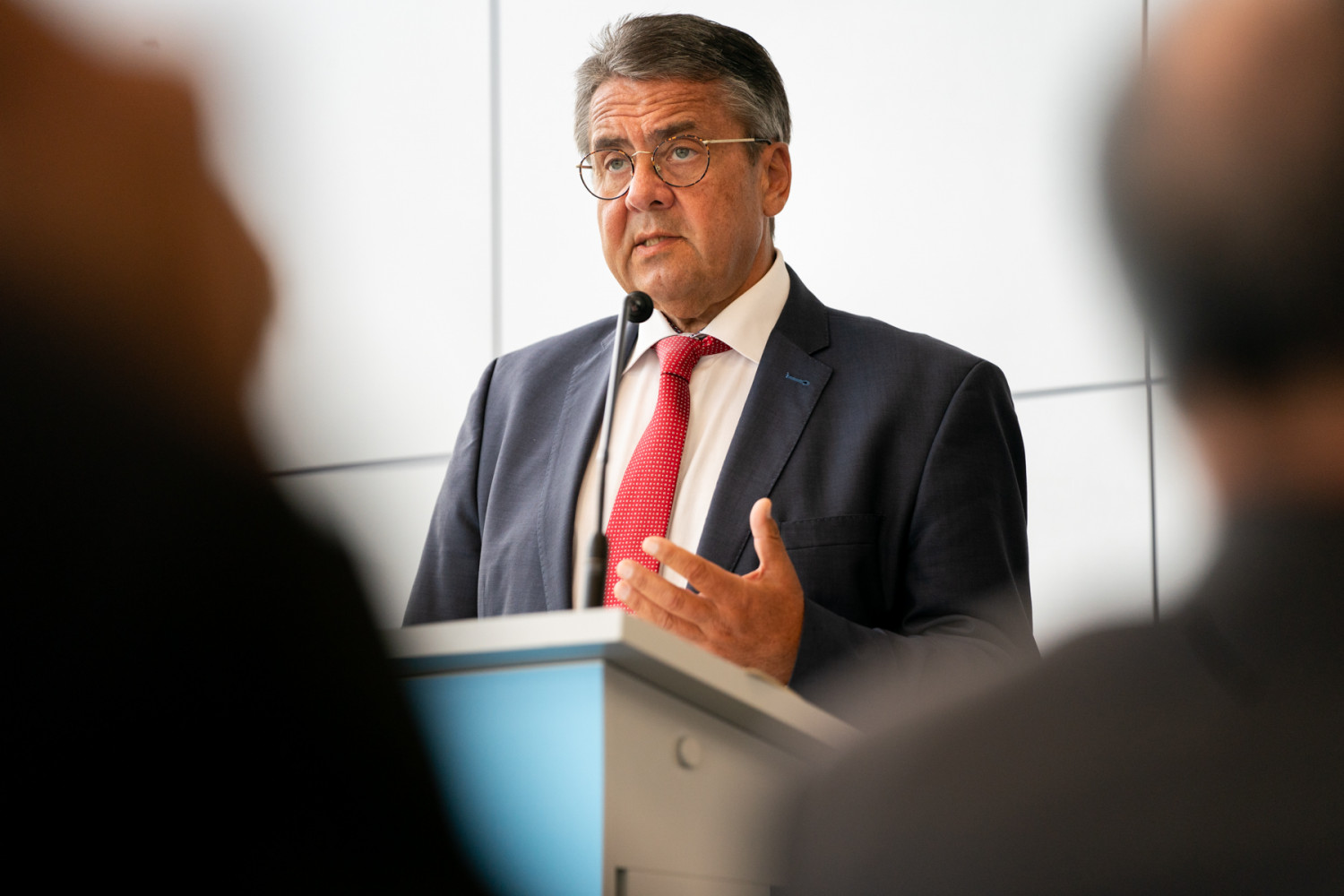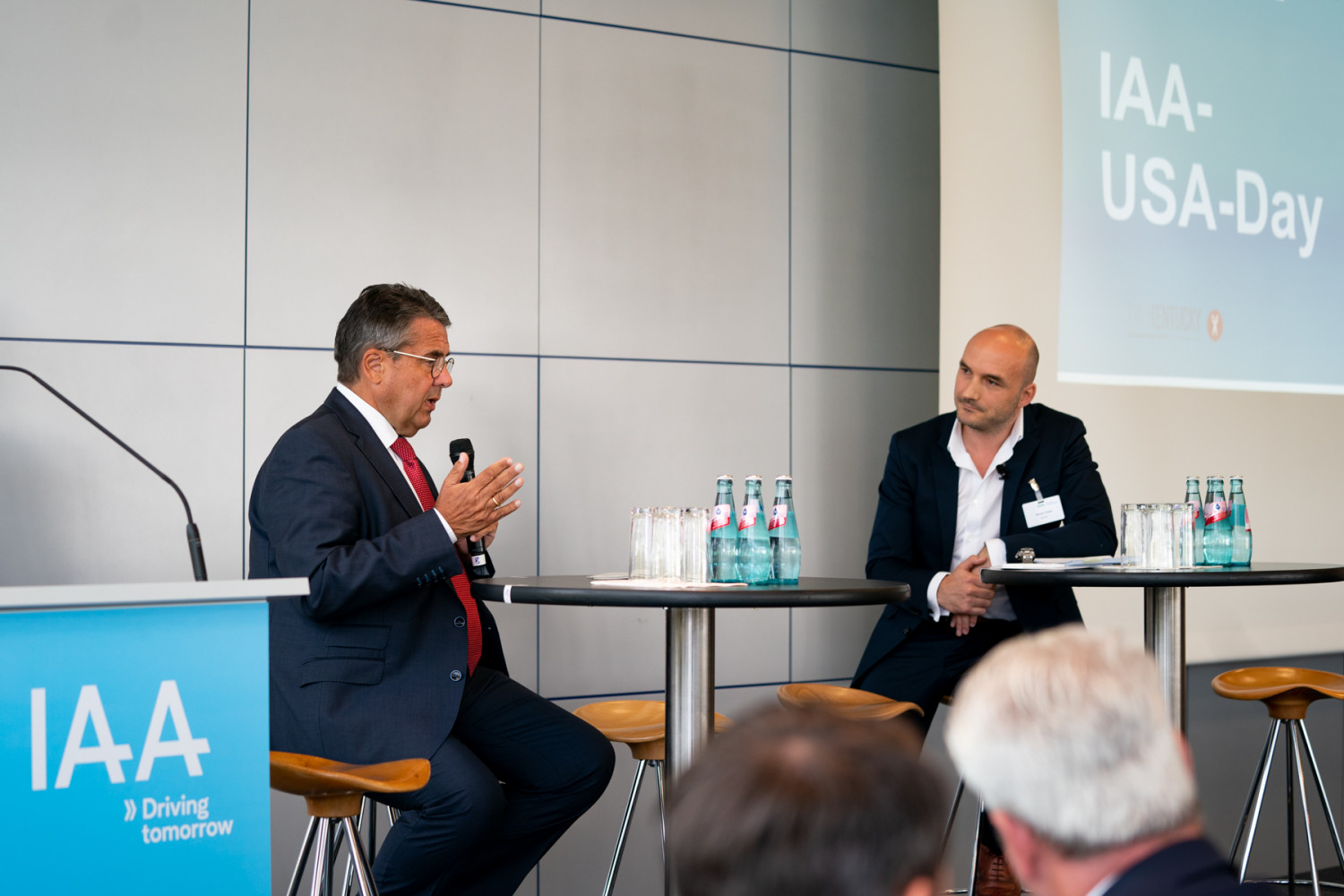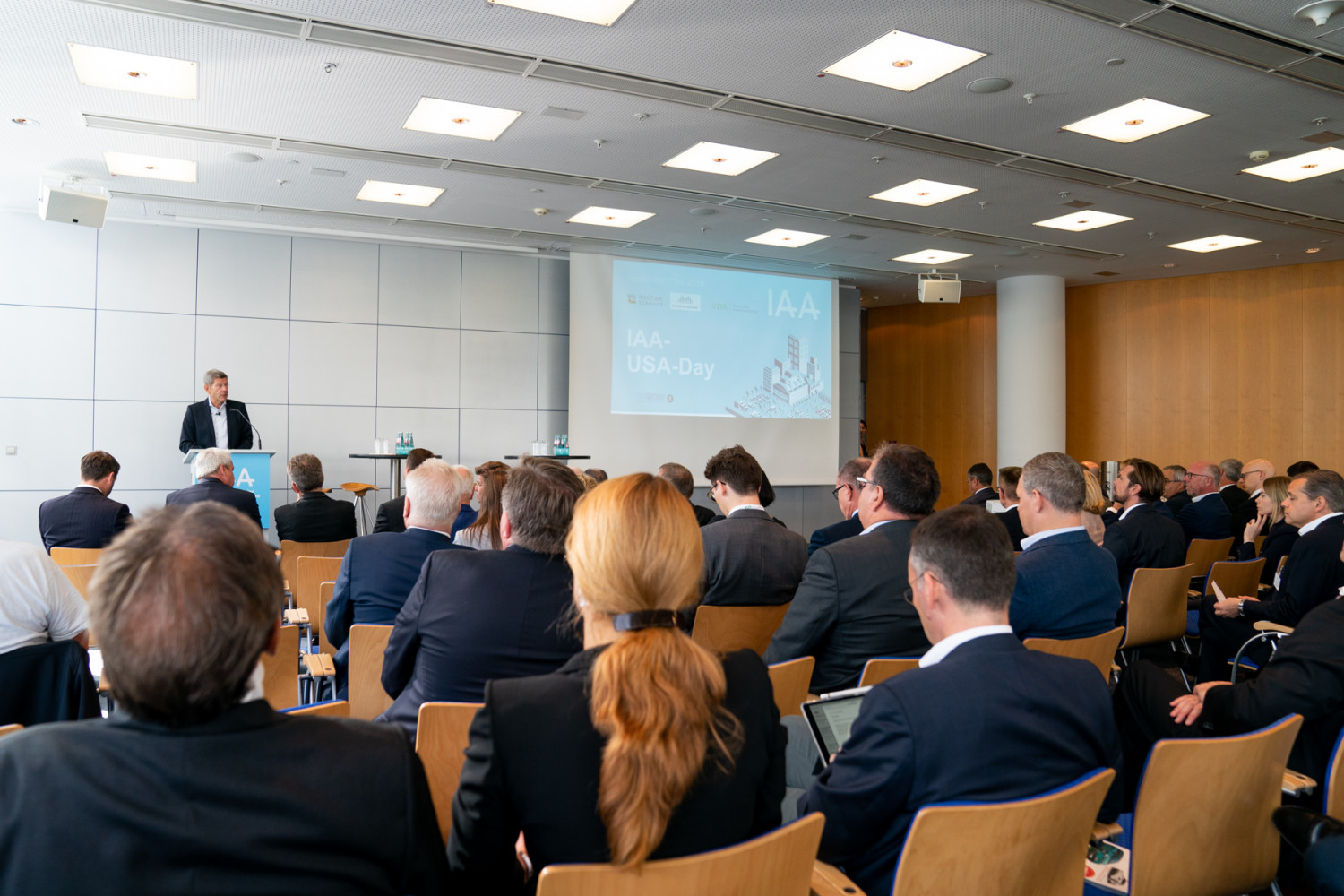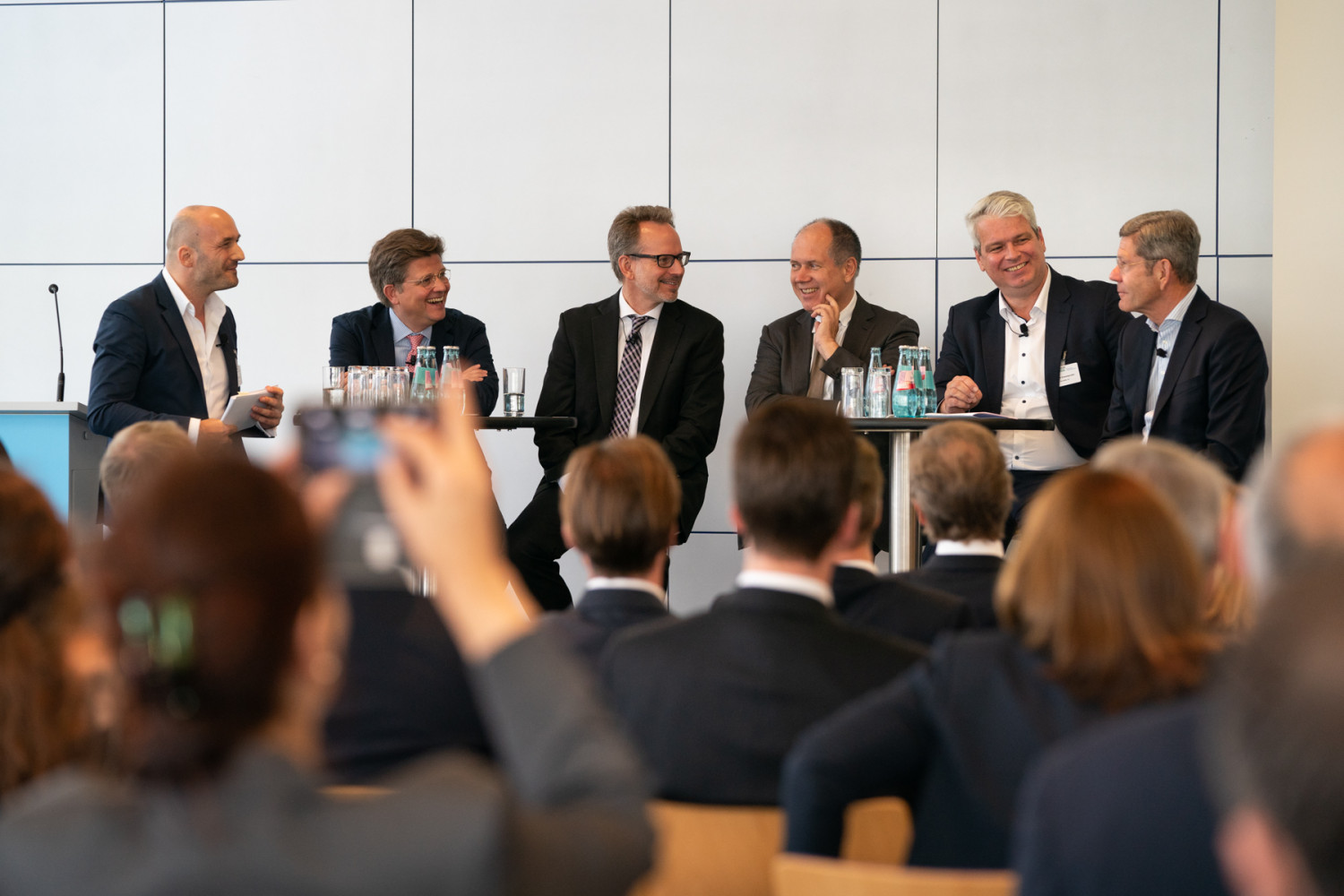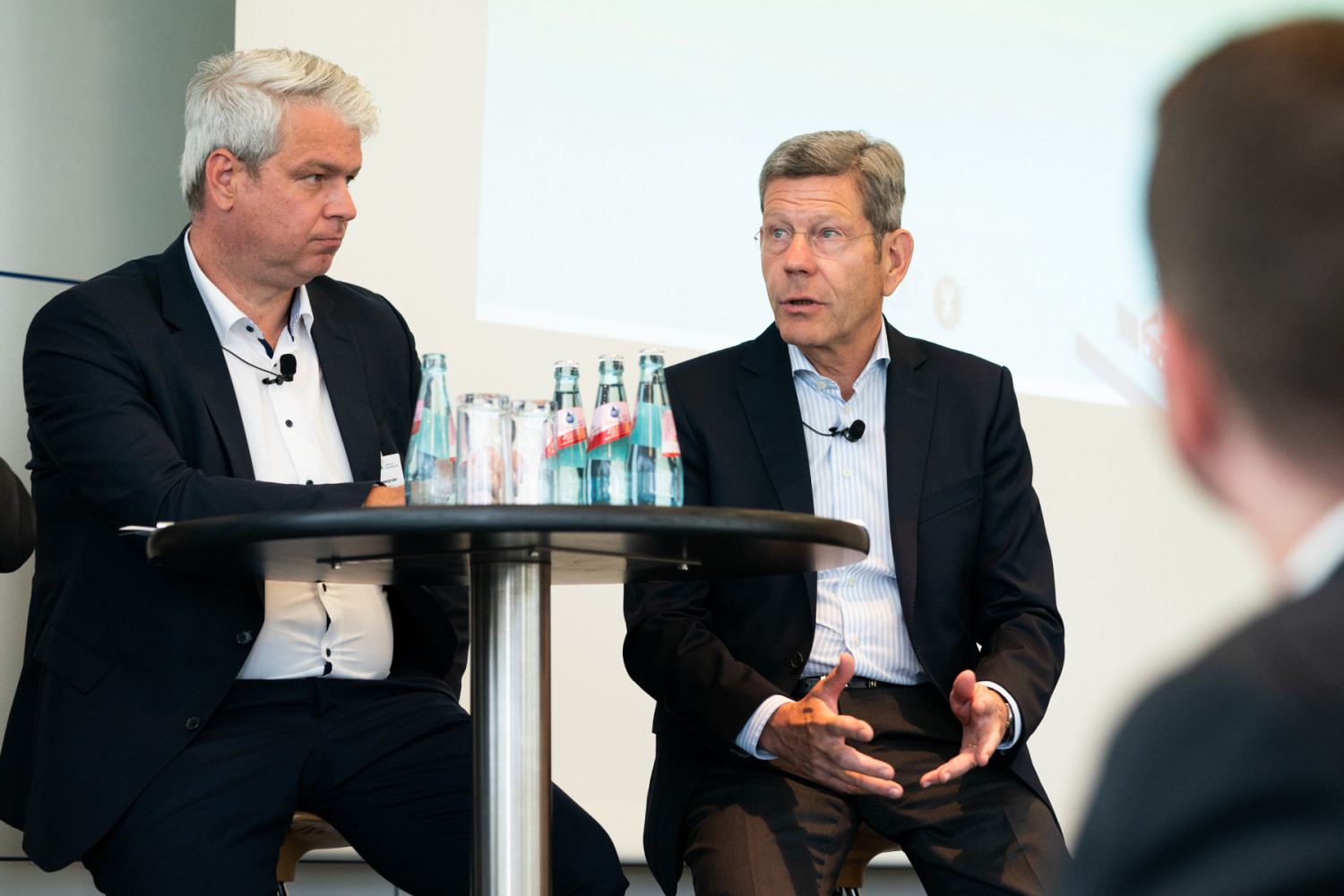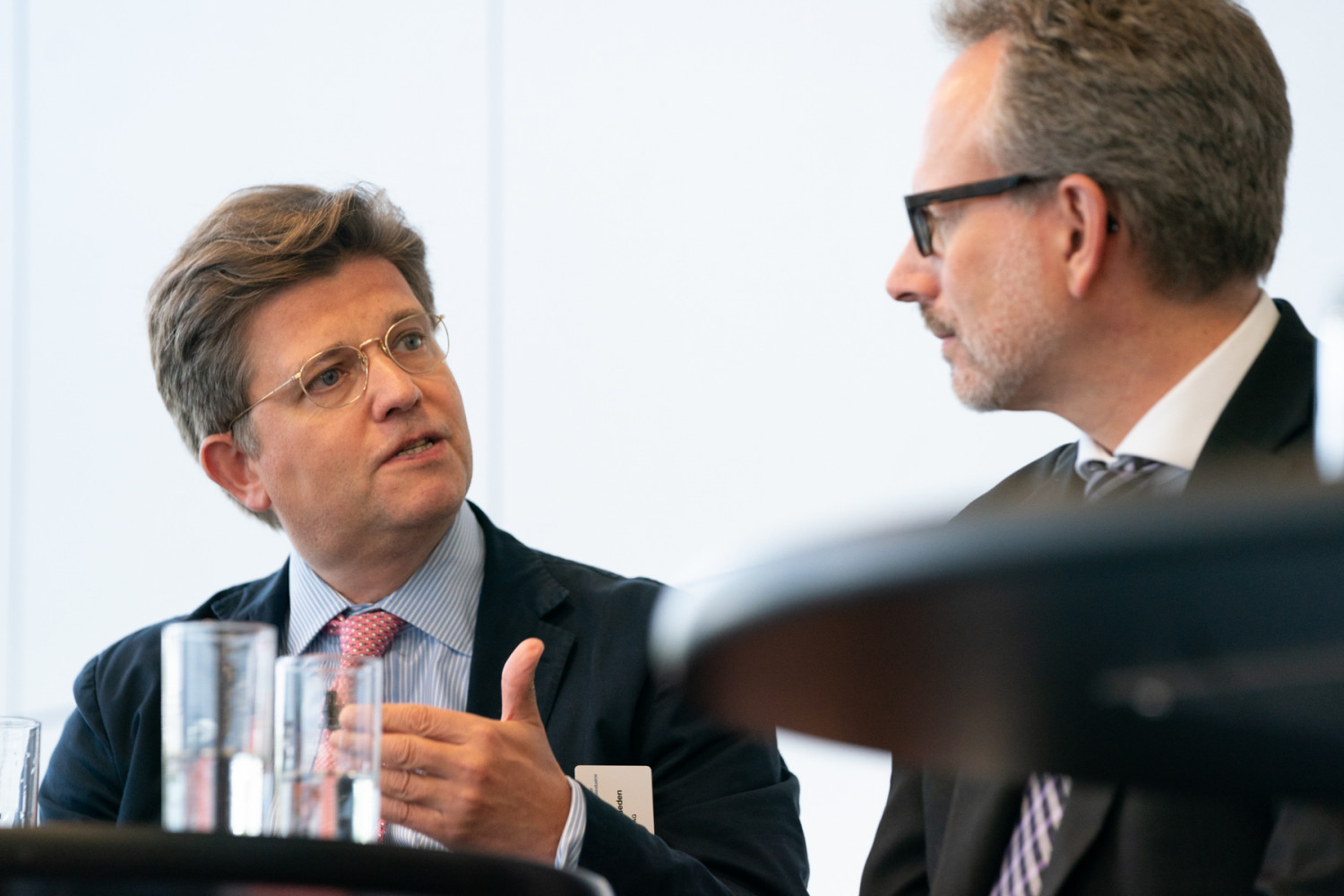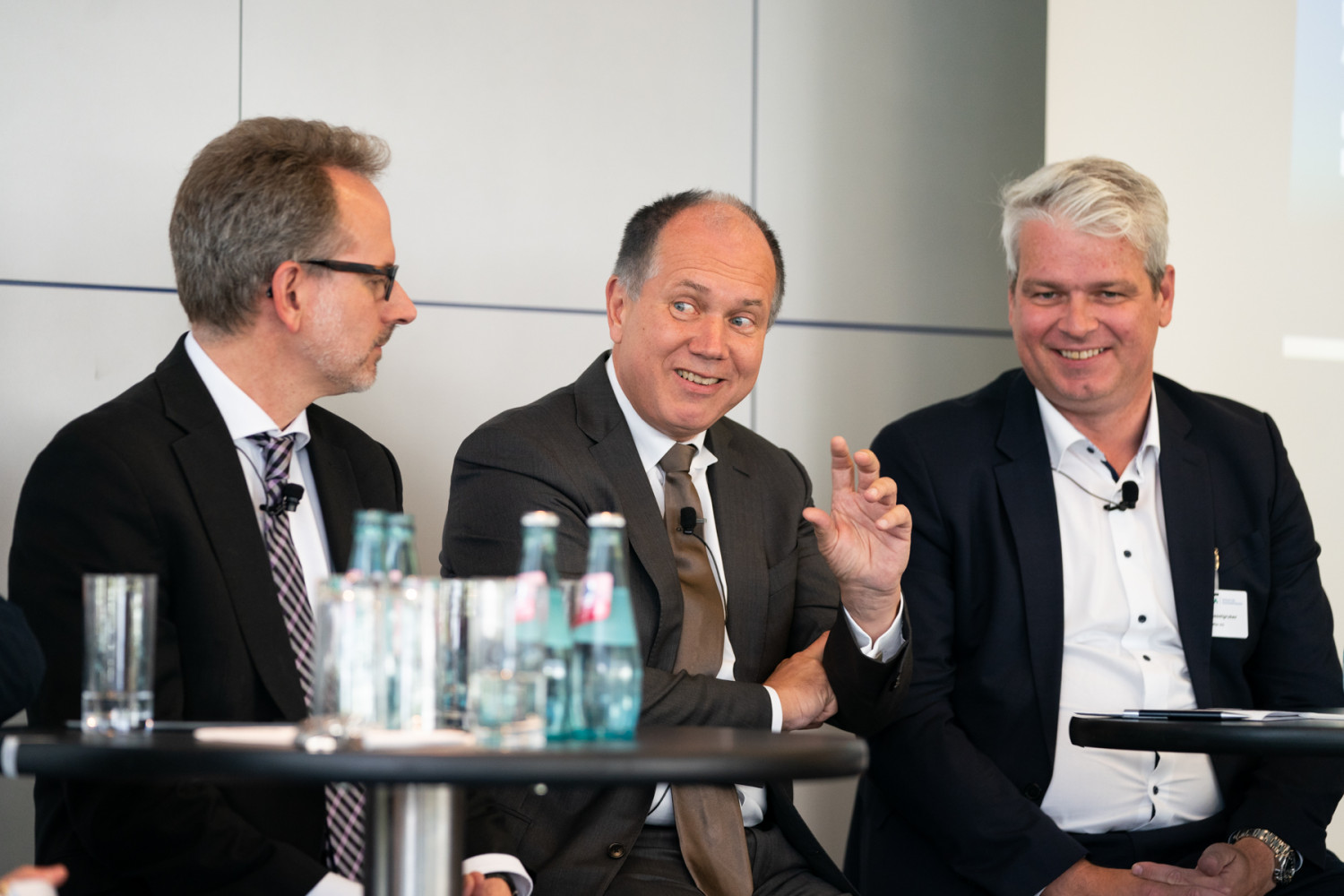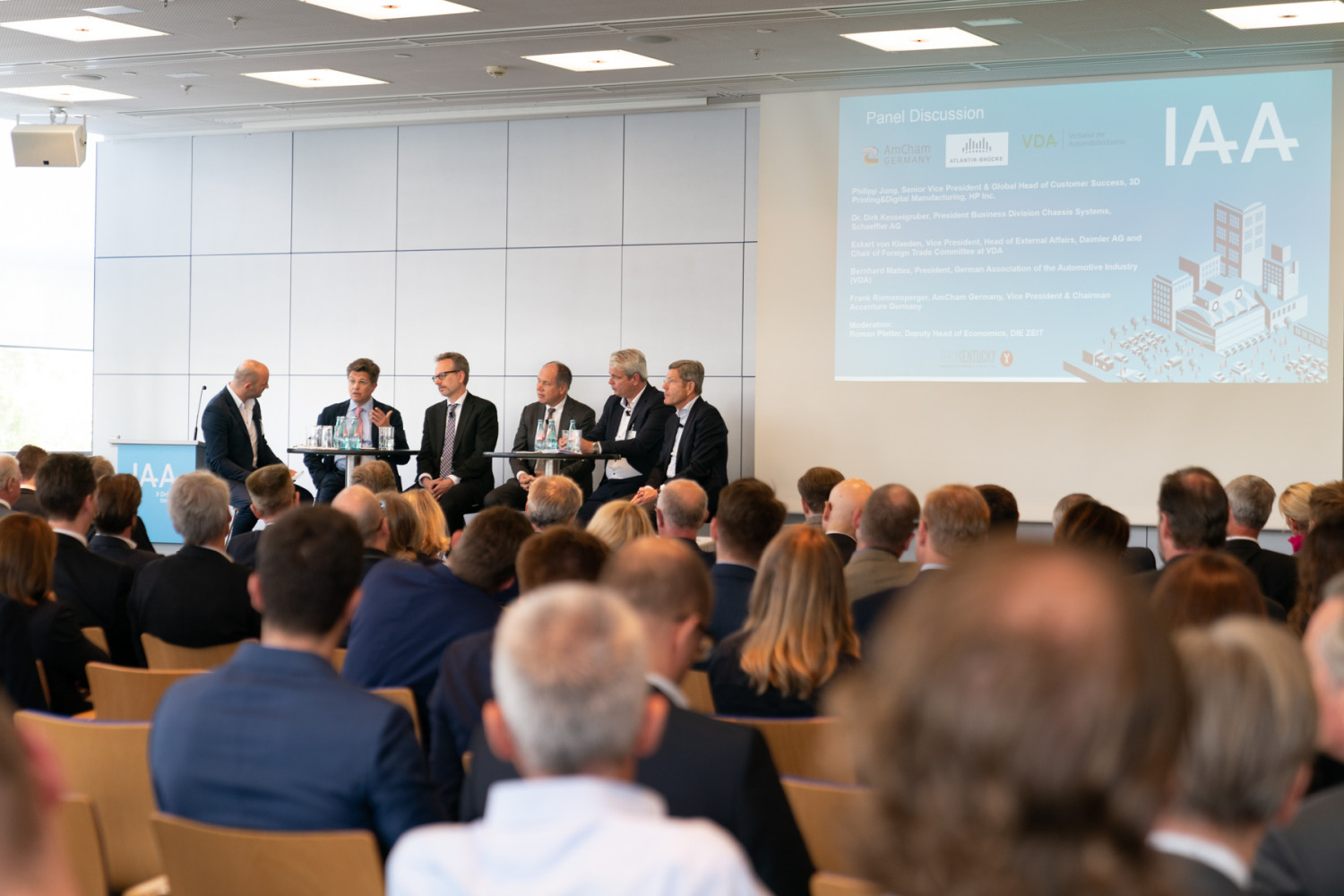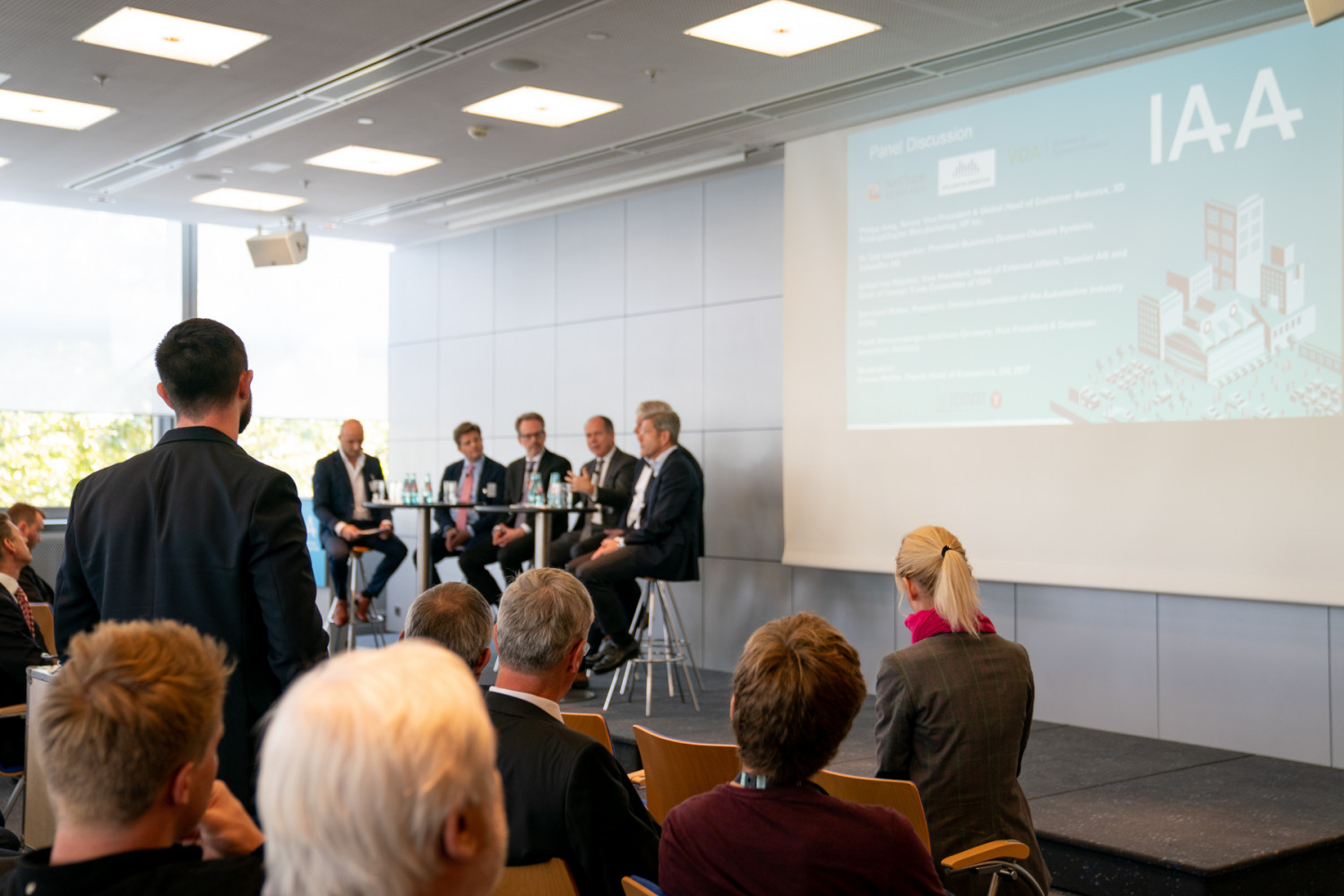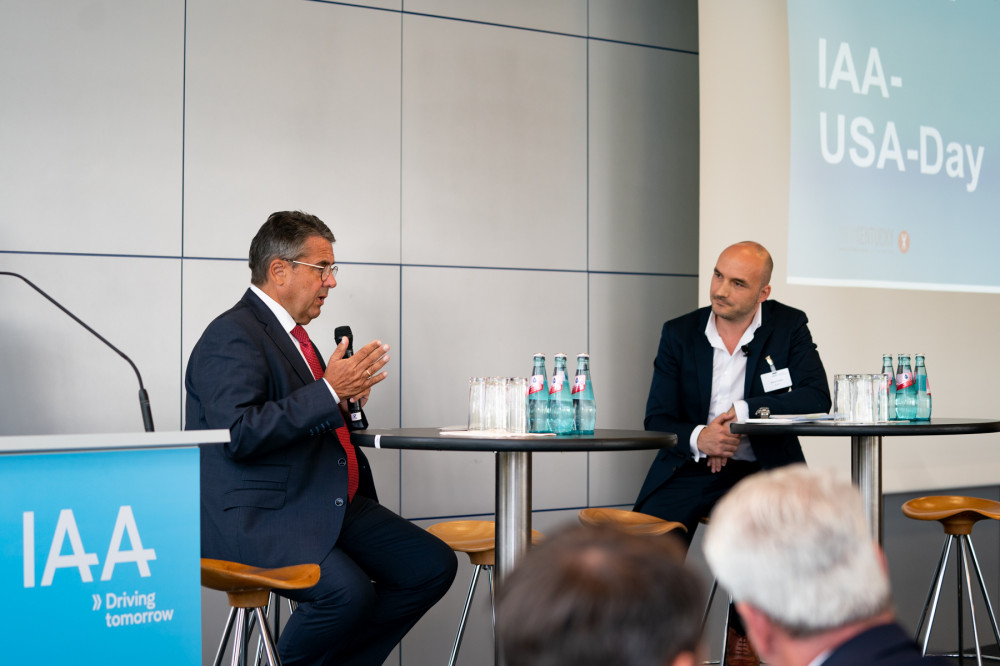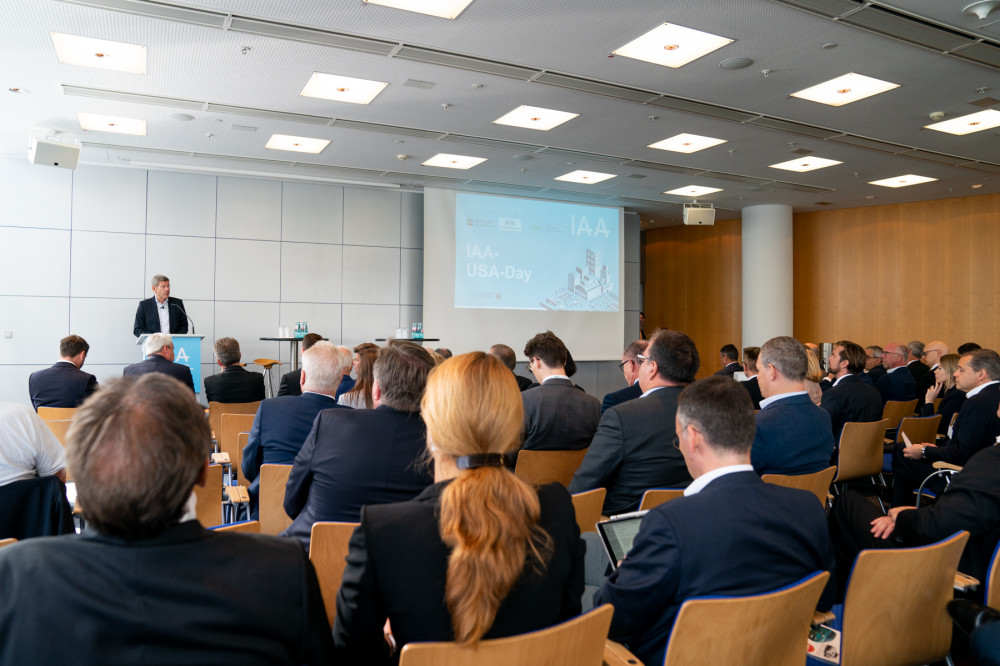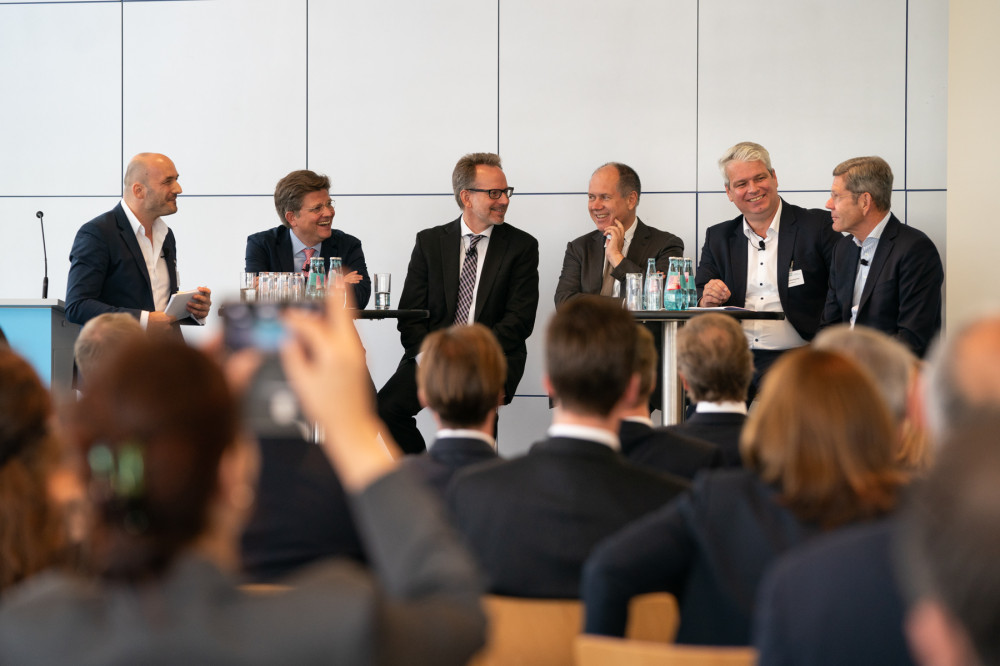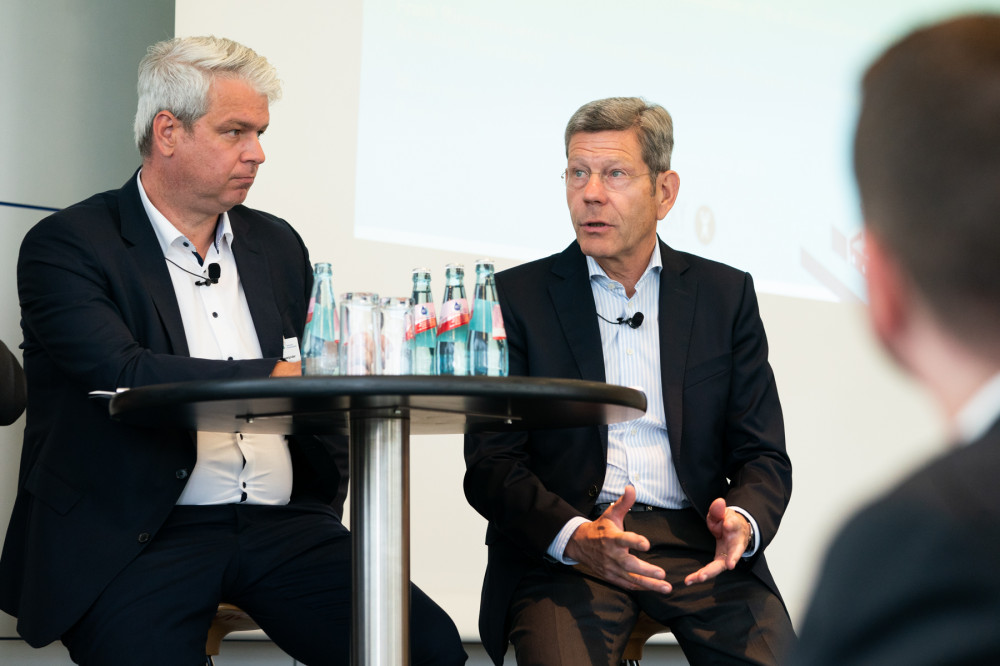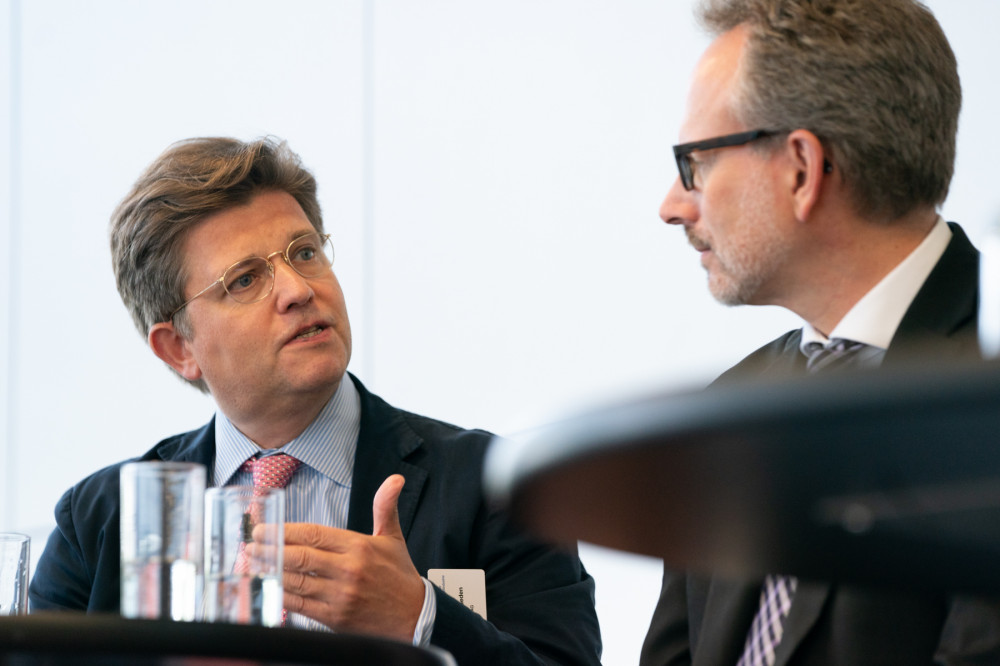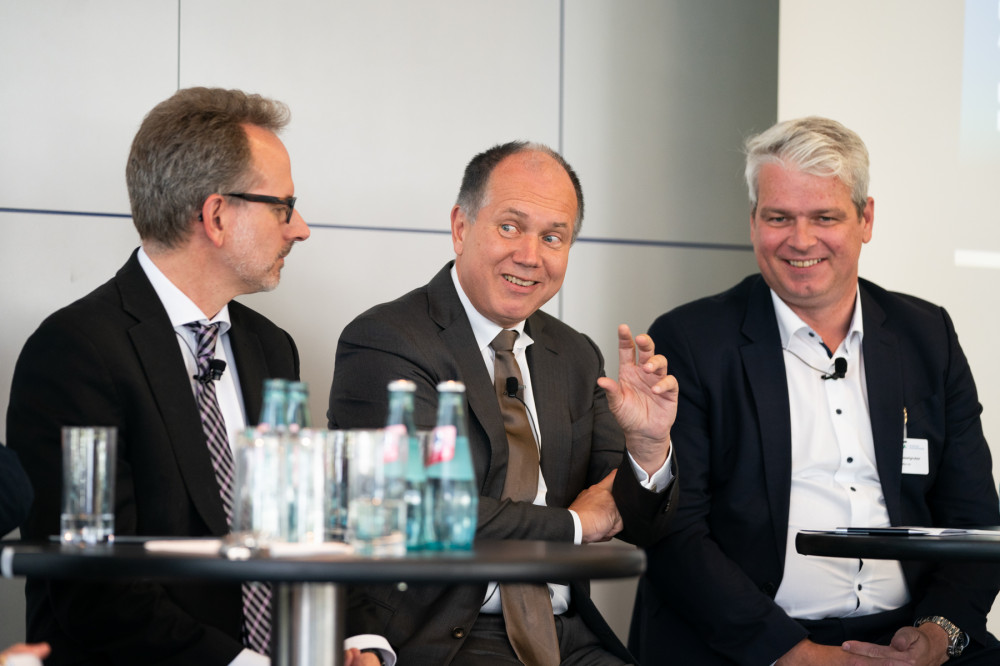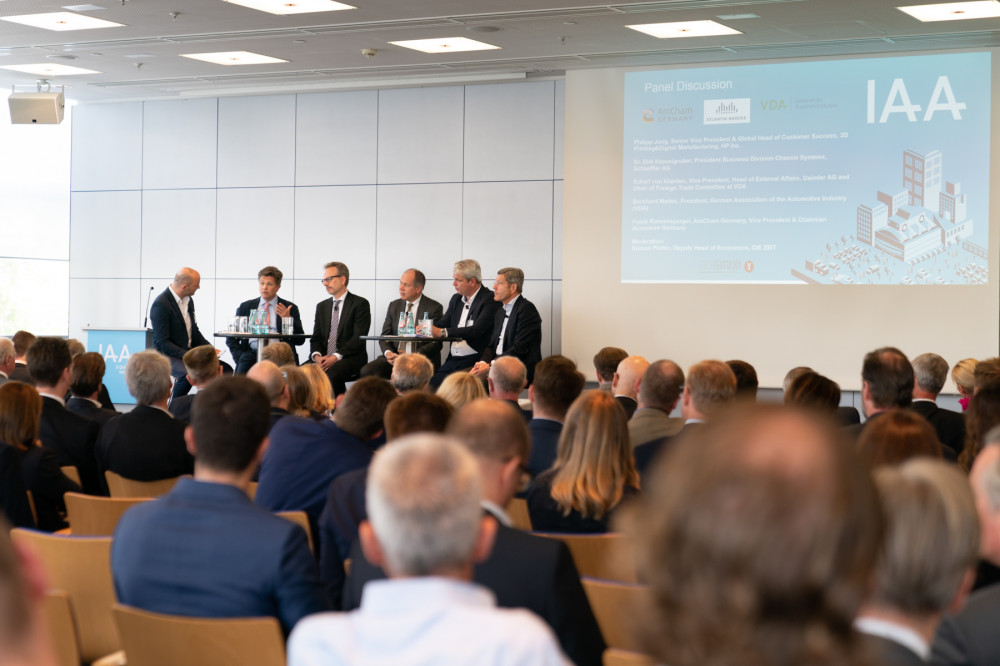IAA: Transatlantic Challenges and Opportunities
Der Vorsitzende der Atlantik-Brücke, Bundesminister a.D. Sigmar Gabriel, war Keynote-Redner anlässlich des USA-Tages auf der IAA. Er sprach über die Herausforderungen im transatlantischen Verhältnis, den Handelskonflikt und den deutschen Exportüberschuss, aber auch über die Aufgaben, denen sich Deutschland angesichts der Digitalisierung stellen muss. Im Anschluss an die Rede fand ein Expertenpanel statt mit Philipp Jung, HP Inc., Dr. Dirk Kesselgruber, Schaeffler AG, Eckart von Klaeden, Daimler AG, Bernhard Mattes, VDA, sowie Frank Riemensperger, AmCham Germany und Accenture Germany. Moderiert wurde das Panel von Roman Pletter, DIE ZEIT. Die Veranstaltung wurde von der Atlantik-Brücke in Kooperation mit der AmCham Germany und dem VDA ausgerichtet.
“Transatlantic Challenges and Opportunities“
Keynote von Sigmar Gabriel
Dear Mr. Mattes, Ladies and Gentlemen,
My keynote today is entitled „Transatlantic Challenges and Opportunities“. So I assume that you expect both a realistic assessment of the situation from me, and some hopeful messages. To be frank, the latter is not an easy task these days – even for the Chairman of Atlantik-Brücke – especially when it comes to the automotive industry. The challenges are big and they are far from being overcome.
Apart from the disruptive changes within the industry, we are dealing with a US administration that has set the goal for itself to reduce the trade deficit of the United States.
The robust approach, especially in trade policy, creates the impression for many market participants that President Trump is willing to accept high costs, including growing frustration and the loss of confidence among partners and friends within the Western alliance.
This tough course involves risk – not only for the Europeans – as it undermines confidence in the stability of global trade as a whole. The trade conflict with China and repeated threats against the EU already impact global markets today.
Diplomacy is tense, uncertainty is casting a shadow over investment. As recent calculations by the Cologne Institute for Economic Research have shown, in the first quarter of 2019 global trade lay 0.8 percent below the level of the same quarter of the previous year – the strongest decline since the global financial crisis in 2009.
Part of the decline of global trade is due to the direct effects of the trade conflicts between the US and China and the continuous tensions between the US and Europe. The confidence shock due to high uncertainty has, however, even stronger effects on global dynamics.
What worries me is a growing sense of uncertainty and its unpredictable consequences for the global economy.
Ladies and gentlemen, what worries me most is not so much the transatlantic disagreement in particular areas of economic policy, for example in the energy sector. They can be sorted out sooner or later. What worries me is a growing sense of uncertainty and its unpredictable consequences for the global economy. To my mind, the main economic risk today does not lie – as in 2008 – with banks and borrowers, but in the fact that the Western guarantor of global order is perceived as politically erratic and unpredictable. Against this background, other trouble spots in the world seem all the more dangerous. In other words: anything may happen. Uncertainty, though, is not the right environment for bold investments and stable growth.
In Chinese, there’s a saying, „May you live in interesting times!“ For some it sounds like a promise, for others it sounds like a threat. (In China, it is considered a curse.)
Whether we like it or not: our times are interesting, there is no doubt about it. In fact, we are witnessing the dawn of a new era.
Many of our certainties are currently being questioned and, in some cases, turned upside down – and at a rapid pace. Trump in America, Brexit in Europe, China on the move, the mainstream political parties in an existential crisis, right-wing nationalists in parliament – all this seemed almost unimaginable to us just a few years ago.
Walter Rathenau, a Foreign Minister of the German Weimar Republic, once said that „the economy is our destiny“. He was right – for without the dramatic world economic crisis in the late 1920s, the end of the first German democracy would probably not have come so quickly.
We have to keep this in mind when we talk about the economic outlook. The economic is political!
So what’s in store for us economically?
Before I take a closer look at global trade, and the transatlantic economic relationship in particular, please allow me to shed some light on the situation here in Germany. We should not fall into the trap of making others responsible for all of our problems. There are several areas of our own economic and fiscal policy in Germany and in Europe which have to be reconsidered.
Only recently, the Bundesbank has published its forecast for the economic performance of our country in the second quarter of this year. The Bundesbank assumes that economic output will decline and that – and I quote – the „underlying economic trend will remain weak“.
For 2019 as a whole, the Bundesbank now expects growth of 0.6 percent. The forecast had been 1.6 percent in December 2018. The major economic research institutes (Ifo, ZEW and RWI) also agree that the economy is weakening. The German economy is losing momentum.
Behind these figures are alarming trends: While the domestic economy has benefited from special factors in the construction industry and consumer demand, there are now clear weaknesses in the traditional export sectors – industry and manufacturing. At any rate, German economic output is currently primarily driven by consumption and not by the strength of the German export economy – unlike in past decades.
In addition to the slowdown in the industrial sector which until today remains largely unnoticed, digitization is driving structural change in companies. Both effects are now becoming apparent on the labor market.
When presenting the labor market figures for the summer, Germany’s Federal Employment Agency stated that the almost ten-year-long decline in unemployment had virtually come to a standstill. The unemployment rate remained at 4.9 percent. The same applies to the increase in employment, which is also stagnating – albeit at an all-time high of 45.28 million people.
Almost all well-known German companies have taken measures to cut jobs. However, until today at least only a few of the restructuring measures are due to the general economic slowdown and the global trade war.
Even more important at present are personnel policy adjustments due to digitization. The automotive sector is particularly affected, and the faster the transition from conventional vehicles to battery-operated cars takes place, the stronger the impact.
The same applies to the banks‘ dismantling of their branch networks – not least as a result of customers switching to online banking. There are of course many other sectors and retail businesses where digitization has a similar effect.
Today, the remaining pillars of overall economic growth in Germany are strong private consumption and – thanks to the ECB’s zero interest rate policy – an unchanged dynamic construction sector. However, if there are going to be large-scale layoffs in industry, there is reason to fear that consumer confidence will collapse and that private consumption will stop driving growth.
In this case, the current problems in the industrial sector could quickly turn into a macroeconomic recession. And that risk is increasing. In the mechanical engineering sector, the situation deteriorated so much in the first half of this year that it has been compared to 2009, the year of the mega-recession.
Export is an important driver but also the Achilles’ heel of prosperity in Germany.
Ladies and Gentlemen, in addition to the structural changes due to digitization, our export business is a matter of great concern. And understandably so:
Export is an important driver but also the Achilles’ heel of prosperity in Germany. Our economy is more closely linked to the global market than any other major industrialized country – and that makes us vulnerable.
The German economy has a degree of openness of 84 percent. France, for example, is just over 60 percent and the USA less than 30 percent. This makes us all the more dependent on a stable and resilient global economic environment.
But in the face of a protectionist zeitgeist, this is precisely where we encounter considerable risks: On the one hand, there is the growing uncertainty caused by the trade conflict between the USA and China. The list of American accusations against Beijing is long: unfair competition, barriers to market access, state subsidies, infringements of patents and copyrights, a growing influence of the state on foreign companies – and that is only part of it.
And just because it is Donald Trump who voices these complaints, it doesn’t mean they are not valid. German companies, too, have long had similar experiences.
China itself is currently in difficult shape. The 30-year economic miracle in the Middle Kingdom has liberated more than 600 million people from abject poverty and turned China into a global power. For a long time now, China has been the central sales market for the German automotive industry, mechanical engineering, electrical engineering and many other branches of our manufacturing industry, as well as Germany’s most important trading partner outside the EU. In other words, many industries and companies have long been dependent on the Chinese market. But that is exactly the weak spot. The Chinese government is forecasting the lowest growth level in 30 years: 6 to 6.5 percent. China’s imports and exports have fallen drastically in recent months.
Economically speaking, it is important to stress: When the Chinese dragon coughs, many German industries and companies catch a bout of bronchitis, at least. The ongoing debate about Brexit is of course also one of global economic uncertainties. The economic areas and supply chains of the UK and the continent are closely interwoven. For the German economy, there is an estimated 10 billion euros at stake, should it come to a hard Brexit, a non-negotiated withdrawal of the United Kingdom from the EU. No one knows how this British chaos will end. But that’s exactly what the uncertainty is about.
I personally think that Boris Johnson will come back to one of the first ideas and put the border between Europe and Britain in the Irish sea – to give Northern Ireland a sort of integration in the common market.
Finally, there is another international disturbance for the economy: the crisis in the Gulf. Many ambiguities, a lot of mistrust and above all a lot of weapons make this situation so unpredictable and dangerous. The Strait of Hormus is one of the main arteries of the global economy. Almost 40 % of the world’s oil reserves are transported via this route.
Pacific trade conflicts, Chinese economic weakness, British withdrawal or the tanker crisis in the Gulf – the German economy with its export orientation is sensitive when it comes to world politics. And Germany can by no means influence all of these factors effectively in its own interest.
Given our dependence on export, the current course of the US administration causes some distress. For the German economy, a lot is at stake. The US accounts for 8.6 percent of German exports and is therefore the biggest export market. Machinery (including electrical machinery and telecommunications), automotive products and pharmaceuticals account for 71 percent of German exports in the US.
According to unpublished research of the Cologne Institute for Economic Research, those three categories make up 82 percent of the German trade surplus with the US, which amounted to 66 billion euro in 2018. From a US point of view, Germany ranges third among the countries with high trade surpluses vis-a-vis the United States. But just to put things in perspective here: The US deficit against Germany is more than six times lower than the US deficit against China.
Nevertheless, US tariffs on imported vehicles from European are not yet off the table. Should these tariffs be implemented, the consequences for German car manufactures would be highly problematic. And of course, harming the German automotive industry would also harm innovation, growth and jobs in the United States. This has been repeatedly pointed out not only by the VDA but also by Chancellor Angela Merkel – and with good reason. I think it’s hardly surprising that the majority of US industry leaders reject the idea of imposing auto tariffs on the European partners.
As my colleague on the board of Atlantik-Brücke, the economist Michael Hüther, has pointed out recently: „The automotive industry is a leading sector of the German economy, recently accounting for 40 percent of all patent applications in Germany.“ In fact, the effect of the tariffs goes beyond the car industry, since they act like a nail in the coffin on free trade and do not exactly promote the path of negotiations that has actually been taken.
Ladies and Gentlemen, I think in front of this audience today, I don’t have emphasize the crucial role that German manufactures and German suppliers play in the US economy.
They create tens of thousands of jobs in the United States, they have a huge and positive impact on the regional economies around their production facilities in various regions of the United States. In fact, many of the top end models are built in the US. As a matter of fact, they are the biggest car exporters of the United States. The effect on US export business must not be underestimated: These companies sell more than half of their production outside the US. Against this backdrop, it is at best absurd to justify possible tariffs with a national security risk.
Nevertheless, I believe that it is not enough to point out the achievements and advantages of the automotive industry to our American partners.
Branding the trade policy of the United States as irrational does not solve anything. Indeed, the German trade surplus is a massive problem.
Branding the trade policy of the United States as irrational does not solve anything. Indeed, the German trade surplus is a massive problem. President Trump is addressing a problem that we should not ignore.
We pay the price for the fact that Germany has refused to do anything about its current account surplus for decades. Someone has to pay for an annual surplus of 6-8 percent. The OECD and economists around the world are cautioning about this imbalance.
There has actually only ever been one group of economists who thought Germany’s annual current account surplus to be an expression of our strength: German economists. They considered all of their international colleagues to be absurdly wrong. The fact is that a permanent surplus has to be refinanced by other countries, if the money is not to be pulled out of a magician’s hat.
The United States with their considerable budget deficit had the role of “magician’s hat” for many years. And Donald Trump will no longer accept that. Americans call this behavior „freeriding“. By the way, I warn against considering this merely a personal whim of Donald Trump’s – combined with the silent hope that his successors in the White House will be more accommodating. They will hopefully be more friendly in tone, but they will remain just as tough on the issue of American interests. We must not be under any illusions here!
So it would be good if we took matters into our own hands.
The balance of the current account, which captures not only trade in goods but also services and other sources of income, is a complex, macroeconomic phenomenon and depends on many factors. The divergence of the fiscal policy stance of the US and of Germany is one of them. Whereas the US run a fiscal deficit of 4.3 percent of the GDP in 2018, in Germany we had a surplus of 1.7 percent of the GDP in the same year. The savings of private households and businesses in the US have not been sufficient to finance the government deficit for years – the result is, expenditures are higher than domestic income and capital from abroad is needed to finance the current tax reform and public spending increases.
In Germany, demographic trends and an ageing population are particularly acute and render savings necessary – both private and public. Therefore, a surplus in trade is not surprising and the trading partners should not expect Germany to become a deficit country in the next years.
We need to improve Germany’s attractiveness to investors and businesses by improving both transportation and digital infrastructure, as well as providing incentives for research and development.
However, a tax reform and increases in public investment are badly needed in Germany, particularly considering the credit market conditions. Now is the time to act. We need to improve Germany’s attractiveness to investors and businesses by improving both transportation and digital infrastructure, as well as providing incentives for research and development. This would also foster private investment and have a dampening effect on the current account surplus.
This concerns the dogma of „staying in the black“ (Die schwarze Null) – a policy that now threatens the substance of our economic performance and prosperity: the result is an outdated, strained and increasingly dilapidated public infrastructure in schools, universities, railways, the energy sector and digital infrastructure.
The investment backlog continues to grow. The public infrastructure is the calling card of a country – roads and schools in a dismal state are not only a problem for our economy, but also a problem for our democracy!
The second challenge is digitization. Here, Germany threatens to fall further behind in international comparison: We must not underestimate this development. The data-driven global economy is rapidly changing our traditional model of value creation.
It is no longer just the product itself that counts, the product that we Germans have developed particularly well, efficiently and productively in the last 200 years of industrialization.
Instead, the data platforms integrated into production become the determining part of the value chain. But they will be dominated by five American companies and soon – if everthing goes according to the Chinese President’s plans – by ten Chinese companies. Germany is in danger of being nothing more than an extended workbench.
We should focus on traditional industrial and industry-related production and service sectors. On smart factories and new mobility concepts, on production and logistics, on speech technology and robotics.
We should therefore develop our strengths and not try to catch up on developments that we are not good at to begin with. In start-ups and B2C, we are lagging behind the US and China. Neither the consumer-oriented business models of American companies (Amazon and Co.) nor the smart-city competence of the Chinese are within reach for us. Rather, we should focus on traditional industrial and industry-related production and service sectors. On smart factories and new mobility concepts, on production and logistics, on speech technology and robotics.
The third challenge concerns our industry, specifically the German automotive industry. With its 800,000 jobs, it continues to be the backbone of our industrial nation, especially in Lower Saxony.
The entire industry is undergoing a historic, multiple stress test: it must technologically master the shift both towards autonomous driving and towards alternative drives, the keyword here being E-mobility. These challenges both have to be met at the same time and be backed up by gigantic investments!
Competitors have emerged in Asia and America, questioning the entire business model of car manufacturers: software will be more important than hardware when it comes to mobility for future generations. Utilization is more important than ownership.
Currently, all manufacturers are investing massively in digital capabilities and are hiring, at least in this area of expertise. Volkswagen alone has announced it will create 9000 new jobs. At the same time, artificial intelligence in production and the switch to electronic motors will ensure that significantly fewer people are needed for production.
Accordingly, VW will cut 23,000 jobs this year alone. On balance, this represents a loss of 14,000 jobs. I haven’t even talked about the other manufacturers and many suppliers yet. We have to be careful to set the right course as an industrial location!
The third challenge is therefore qualification and further training. This will ultimately decide the fate of the social market economy. We already have a shortage of skilled workers in many sectors and regions.
But that also means that the labor market is almost empty! It is becoming increasingly difficult to find good people – this is true not only for skilled workers, but increasingly also for non-skilled labor.
According to experts, almost 700,000 additional digital specialists will be needed by 2023 in Germany alone. (Not to mention other sectors – e.g. nursing care). This gap cannot be bridged with young talent and migrants alone – demographic change is having a far too drastic effect.
So we have to make sure that today’s workers can do tomorrow’s work.
At the same time, we must keep in mind that more than a quarter of today’s jobs can be automated through artificial intelligence. On the assembly line, but also in the office. But a dismissed industrial technician does not automatically become an IT professional. So we have to make sure that today’s workers can do tomorrow’s work.
If we remain spectators to this development, we will find ourselves in a paradoxical situation where both the shortage of skilled workers and unemployment are on the rise and the labor market is split.
This is a feat of strength for Germany as a business location, one that politicians, industry and trade unions must tackle together.
So we have enough tasks of our own in Germany and Europe – economic and political. The impending trade conflict with the USA should not become an excuse for us to get out of doing our homework. These will certainly include:
-a corporate tax reform that keeps us competitive as an investment location
-the development of the e-mobility infrastructure, which I currently consider to be the greatest obstacle to the breakthrough of e-mobility
-the increase of budgets for research and development
-investments in schools and universities
-an active fiscal policy
The stronger Germany and Europe are, the more interesting the transatlantic partnership becomes for the nations on both sides of the Atlantic.
So where is our economy headed?
Are we really facing the „perfect storm“ that some experts see coming? Mark Twain, the great American writer, once said: „Predictions are difficult – especially when they concern the future“. He’s right about that. In this respect, I would warn against staring too closely at the economic barometers. We should do our homework instead, so that the social market economy is storm-proof for the new decade.
Thank you very much!

